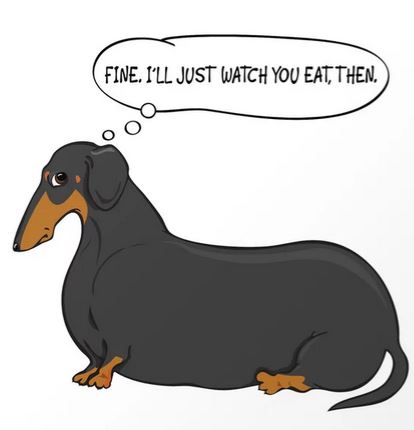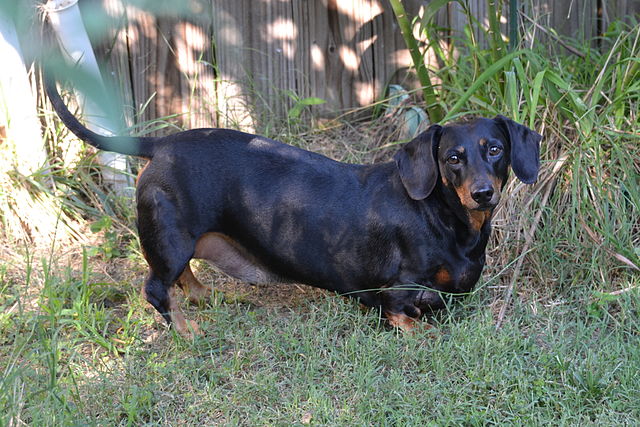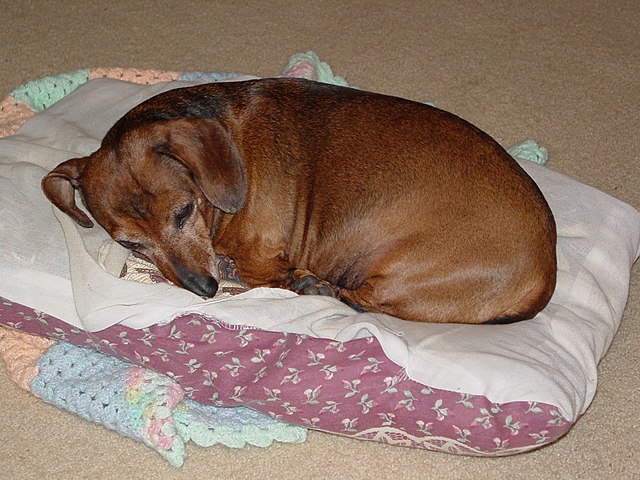The Issue with Fat Dachshund
While dachshunds may be cute and cuddly, their unique body shape also makes them prone to gaining weight easily. In fact, according to a study by the Association for Pet Obesity Prevention, around 55% of dachshunds in the United States are overweight or obese. This can lead to a variety of health issues that can impact their quality of life or even shorten their lifespan.
As responsible pet owners, it’s important to recognize the dangers of allowing our furry friends to become overweight and take steps toward helping them maintain a healthy weight. In this article, we’ll discuss why dachshunds get fat in the first place, the dangers of obesity in this breed specifically, and provide tips on how you can help your chunky wiener dog lose weight and live the best life possible!
Why do dachshunds get fat?
There are several reasons why dachshunds may become overweight, including genetics and breeding, lack of exercise and overfeeding, and health issues that contribute to weight gain.
Genetics and Breeding
Dachshunds were originally bred in Germany to hunt badgers. They have a long torso with short legs which make them perfect for digging into burrows.
However, these characteristics can also make dachshunds more prone to weight gain. Breeders often focus on creating a certain look or temperament rather than the dog’s overall health, leading to the potential for genetic predisposition towards obesity.
Lack of Exercise and Overfeeding
Like many other dog breeds, dachshunds require regular exercise to maintain their weight and overall health. Unfortunately, it’s easy for owners to become busy or lazy when it comes to taking their dogs out for walks or playtime. Combine this with overfeeding or giving too many treats as a reward – something that is all too common among pet owners – and you have a recipe for an overweight pup.
Health Issues That Contribute To Weight Gain
Dachshunds are susceptible to several health issues that can lead to weight gain. For example, hypothyroidism is a common thyroid disorder that can cause dogs’ metabolism rates to slow down significantly resulting in increased fat stores even with restricted feeding amounts; Cushing’s disease is another condition that results from an overactive adrenal gland that creates excess cortisol causing increased hunger and thirst while decreasing metabolism rate leading ultimately leading to obesity as well as diabetes mellitus which affects insulin production resulting in improper glucose absorption leading eventually towards fat deposition in important organs like liver which causes obesity too. These disorders require veterinary care to be diagnosed.
The Dangers of Obesity in Dachshunds
As cute as a chubby dachshund may be, carrying extra weight can significantly impact their health and lifespan. It’s important to understand the risks associated with obesity in dachshunds so that pet owners can take the necessary steps to help their furry friend maintain a healthy weight.
Increased Risk of Joint Problems and Back Issues
Due to their elongated bodies, dachshunds are at risk for developing spinal issues such as intervertebral disc disease (IVDD). This risk is increased when they are overweight, as the added pressure on their spine can cause herniated discs and other back problems. These issues not only cause pain for your pet but can also lead to costly surgical procedures and long-term complications.
Additionally, carrying excess weight puts a strain on your dachshund’s joints, leading to arthritis and other joint issues. The stress on their joints is particularly significant for senior dachshunds or those with pre-existing joint problems.
Higher Likelihood of Developing Diabetes and Heart Disease
Obesity increases the likelihood of developing diabetes in dogs. This occurs when insulin levels become imbalanced due to inadequate exercise or poor diet choices. Symptoms include increased thirst, frequent urination, lethargy, and changes in appetite.
A poor diet coupled with a lack of exercise is also linked to heart disease in dogs. Obesity puts an added strain on the cardiovascular system, which increases the risk of heart failure or other cardiac complications.
Shorter Lifespan
A healthy weight can significantly impact your dog’s lifespan. Overweight dogs have an increased risk of developing several health conditions that can limit longevity severely. By maintaining your dachshund’s ideal weight, you can help increase their chances of a long and healthy life.
Helping Your Fat Dachshund
Consult with a veterinarian for a personalized diet plan
The first step in helping your obese dachshund lose weight is to take him or her to the veterinarian for a checkup and consultation. Your vet will be able to provide you with a proper diagnosis of your pet’s condition, explain the risks associated with obesity, and recommend an appropriate diet plan.
Do not try to make any dietary changes until you have consulted with a professional. Every dog has different dietary needs based on their age, medical history, activity level, and overall health.
Increase exercise through walks, playtime, and swimming
Regular exercise is crucial to help your dachshund lose weight. Start by taking your dog on daily walks around the neighborhood or at a local park. Gradually increase the duration and intensity of these walks as your dog gets used to them.
Playtime is also an excellent way to get your dachshund up and moving around. You can engage in games like fetch or tug-of-war that require physical activity from both you and your pet.
Swimming is another excellent low-impact exercise that can help overweight dachshunds shed some pounds without putting too much strain on their joints. If you don’t have access to a pool or lake nearby, try setting up sprinklers in the backyard for them to run through.
Monitor food intake and limit treats
One of the primary reasons why dachshunds become overweight is overeating; this could be due either to excessive feeding or giving too many treats throughout the day. Keep track of how much food you are giving them each day; this includes measuring out portions rather than guessing it by eye estimates. Limiting treats is also essential when trying to get an overweight Dachshund back into shape since treats are usually high in calories.
Try giving them healthier options such as apple slices or carrots, which would provide them with essential nutrients without causing weight gain. Ensuring that your dachshund is healthy and fit requires a good combination of a proper diet and regular exercise.
Be patient while implementing these changes since it will take time to see any significant results. However, by following these tips consistently and adjusting the routine according to your pet’s needs, you can help maintain a healthy weight for your furry friend.
Conclusion
Recap on the importance of maintaining a healthy weight for your furry friend
We’ve discussed the dangers of obesity in dachshunds and why it’s essential to maintain a healthy weight for your furry friend. Being overweight can shorten their lifespan and lead to various health problems. It’s our responsibility as pet owners to ensure that our dachshunds are at a healthy weight, just like we would for ourselves.
Remember that dachshunds have unique body structures, which make them more susceptible to joint problems and back issues. Therefore, it’s imperative to monitor their food intake and exercise regularly to prevent them from gaining excess weight.
Take action today! Towards helping your overweight dachshund
If you have an overweight dachshund, take action today! Consult with your veterinarian for a personalized diet plan and exercise regimen.
Be patient and consistent when implementing changes in your dog’s lifestyle. It may take time for your furry friend to reach their ideal weight, but the effort is well worth it.
Not only will they live longer and healthier lives, but you’ll also enjoy more quality time with them. So let’s all commit ourselves to helping our fat dachshunds lose weight and lead happy lives!





